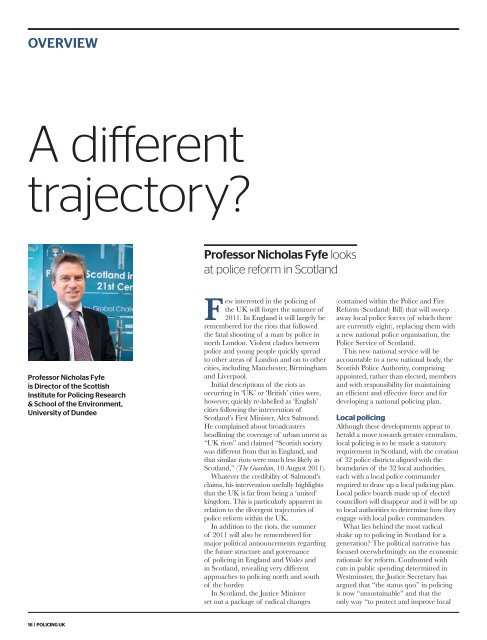Policing UK 2013 - Police Federation
Policing UK 2013 - Police Federation
Policing UK 2013 - Police Federation
You also want an ePaper? Increase the reach of your titles
YUMPU automatically turns print PDFs into web optimized ePapers that Google loves.
OVERVIEW<br />
A different<br />
trajectory?<br />
Professor Nicholas Fyfe looks<br />
at police reform in Scotland<br />
Professor Nicholas Fyfe<br />
is Director of the Scottish<br />
Institute for <strong>Policing</strong> Research<br />
& School of the Environment,<br />
University of Dundee<br />
Few interested in the policing of<br />
the <strong>UK</strong> will forget the summer of<br />
2011. In England it will largely be<br />
remembered for the riots that followed<br />
the fatal shooting of a man by police in<br />
north London. Violent clashes between<br />
police and young people quickly spread<br />
to other areas of London and on to other<br />
cities, including Manchester, Birmingham<br />
and Liverpool.<br />
Initial descriptions of the riots as<br />
occurring in ‘<strong>UK</strong>’ or ‘British’ cities were,<br />
however, quickly re-labelled as ‘English’<br />
cities following the intervention of<br />
Scotland’s First Minister, Alex Salmond.<br />
He complained about broadcasters<br />
headlining the coverage of urban unrest as<br />
“<strong>UK</strong> riots” and claimed “Scottish society<br />
was different from that in England, and<br />
that similar riots were much less likely in<br />
Scotland,” (The Guardian, 10 August 2011).<br />
Whatever the credibility of Salmond’s<br />
claims, his intervention usefully highlights<br />
that the <strong>UK</strong> is far from being a ‘united’<br />
kingdom. This is particularly apparent in<br />
relation to the divergent trajectories of<br />
police reform within the <strong>UK</strong>.<br />
In addition to the riots, the summer<br />
of 2011 will also be remembered for<br />
major political announcements regarding<br />
the future structure and governance<br />
of policing in England and Wales and<br />
in Scotland, revealing very different<br />
approaches to policing north and south<br />
of the border.<br />
In Scotland, the Justice Minister<br />
set out a package of radical changes<br />
(contained within the <strong>Police</strong> and Fire<br />
Reform (Scotland) Bill) that will sweep<br />
away local police forces (of which there<br />
are currently eight), replacing them with<br />
a new national police organisation, the<br />
<strong>Police</strong> Service of Scotland.<br />
This new national service will be<br />
accountable to a new national body, the<br />
Scottish <strong>Police</strong> Authority, comprising<br />
appointed, rather than elected, members<br />
and with responsibility for maintaining<br />
an efficient and effective force and for<br />
developing a national policing plan.<br />
Local policing<br />
Although these developments appear to<br />
herald a move towards greater centralism,<br />
local policing is to be made a statutory<br />
requirement in Scotland, with the creation<br />
of 32 police districts aligned with the<br />
boundaries of the 32 local authorities,<br />
each with a local police commander<br />
required to draw up a local policing plan.<br />
Local police boards made up of elected<br />
councillors will disappear and it will be up<br />
to local authorities to determine how they<br />
engage with local police commanders.<br />
What lies behind the most radical<br />
shake up to policing in Scotland for a<br />
generation? The political narrative has<br />
focused overwhelmingly on the economic<br />
rationale for reform. Confronted with<br />
cuts in public spending determined in<br />
Westminster, the Justice Secretary has<br />
argued that “the status quo” in policing<br />
is now “unsustainable” and that the<br />
only way “to protect and improve local<br />
16 | POLICING <strong>UK</strong>
















